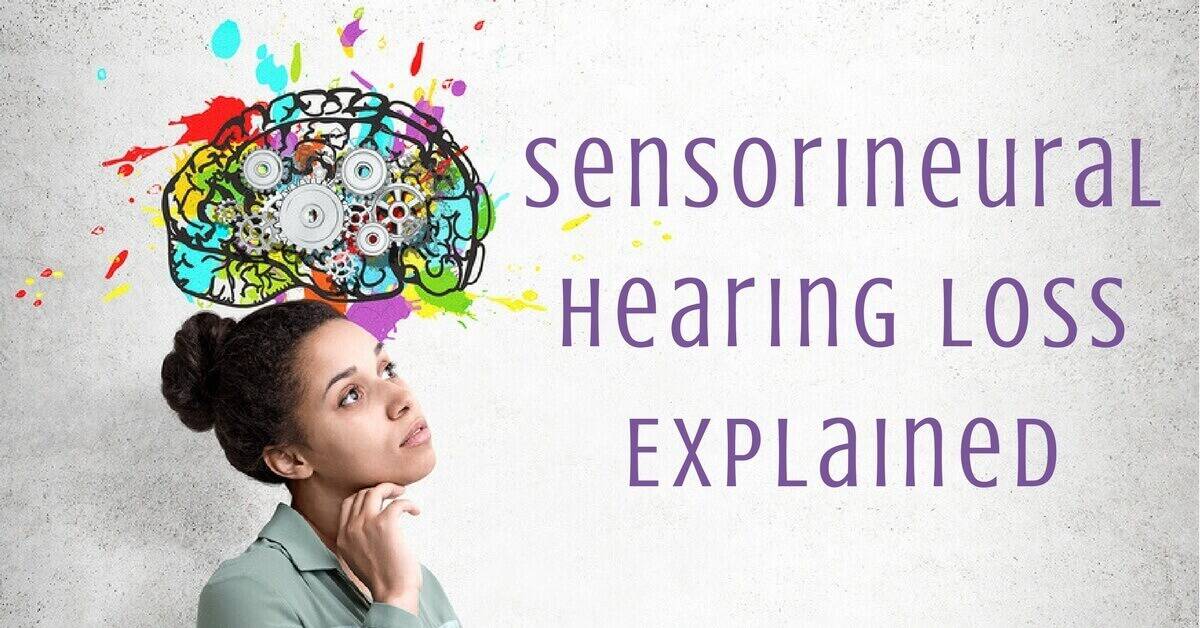Sensorineural hearing loss – it’s quite a mouthful, isn’t it? What is it exactly? Let’s break it down.
Sensorineural: One of the Two Main Types of Hearing Loss
There are two main types of hearing loss: conductive (which pertains to the outer and middle ear) and sensorineural. According to the American Hearing Loss Foundation, sensorineural hearing loss is “the most common type of hearing loss, occurring in 23% of population older than 65 years of age.”
Sensorineural hearing loss pertains to the inner ear area, which is made up of the auditory-vestibular nerve, the cochlea, and the vestibular system (which consists of semi-circular canals). Sound waves enter the ear and are transformed by the inner ear into signals that are sent to the brain by the auditory nerve. The brain then registers this signal as a sound. Sensorineural hearing loss occurs when there is damage to the cochlea or the nerve pathways between the inner ear and the brain. This kind of hearing loss, often permanent, has different causes.
Causes of Sensorineural Hearing Loss
Sensorineural hearing loss may be congenital, meaning it is caused by inherited genetics. In some cases, the malformation of the inner ear results in hearing loss. Otosclerosis (a hereditary bone disorder) and Meniere’s disease (a disorder of the inner ear) are both causes for sensorineural hearing loss. Certain infections transmitted from mother to infant may lead to sensorineural hearing loss as well, such as rubella or human Cytomegalovirus (HCMV). In terms of acquired diseases, mumps, syphilis, bacterial meningitis, and autoimmune diseases may all contribute to sensorineural hearing loss.
Unfortunately, some medications used to treat the aforementioned diseases may also cause sensorineural hearing loss by irreparably damaging the hair cells of the inner ear, which do not regenerate. This problem is known as ototoxicity, or “ear poisoning.” Though there are at least 100 classes of drugs that cause inner ear hearing loss, the most common ones are aminoglycoside antibiotics (used to treat bacterial infections, such as meningitis), loop diuretics, and antimetabolites. Researchers are currently in the process of finding alternatives to these drugs, as well as patenting a new aminoglycoside antibiotic that is effective in fighting the specific disease without damaging inner ear cells.
Physical trauma is another common cause for sensorineural hearing loss. Injury to the temporal bone may affect the cochlea, while other head and neck injuries may affect the auditory system. Tumors in the head and neck area may also cause sensorineural hearing loss by creating pressure against certain processing centers of the brain and within the inner ear. Changes in air pressure, such as on an airplane, may also contribute to sensorineural hearing loss with inner ear fluid leakage. Exposure to loud noises, 90 decibels and higher, for an extended period of time, may also cause sensorineural hearing loss.
Sensorineural Hearing Loss and Tinnitus
In some cases, people who suffer from sensorineural hearing loss may also experience tinnitus, a condition in which one hears a sound within the brain without an external stimulus. Sensorineural hearing loss is identified by an audiologist during a hearing test, as well as the extent of hearing loss. Though conditions surrounding the causes of sensorineural hearing loss may be corrected, such as removal of tumors, drainage of fluids within the inner ear, or eradication of certain diseases, the effects of sensorineural hearing loss are usually permanent. The use of a hearing aid drastically improves the lives of people suffering from sensorineural hearing loss.
Protect Your Hearing
Perhaps you’ve woken up the morning after a transcendent experience at a music festival haunted by a high-pitched ringing in your ears. There have been times you’ve griped with neighbors about the incessant construction noise down the street that wakes you up at 5am. And we’ve all been in a movie theater for the latest summer blockbuster when the explosive action scenes are so loud, it feels piercing in our brains.
As we make our way through our days, there are moments in which our hearing feels undeniably assaulted. There are other moments, too, in which our hearing is subtly damaged without us recognizing the consequences until years later. The accumulation of a lifetime of exposure to loud noises, whether through work or play, has an adverse effect on one’s hearing health and could eventually cause permanent noise-induced hearing loss, a form of sensorineural hearing loss. If we are more aware of these subtle moments of hearing damage, we are afforded the opportunity to take preventative measures where we can. The use of earplugs or custom ear protection, or even over-the-ear protective headphones could help.
Hearing tests are also an important part of monitoring your hearing health. If you’ve noticed changes in your hearing, schedule a hearing test with us at Desert Valley Audiology.

